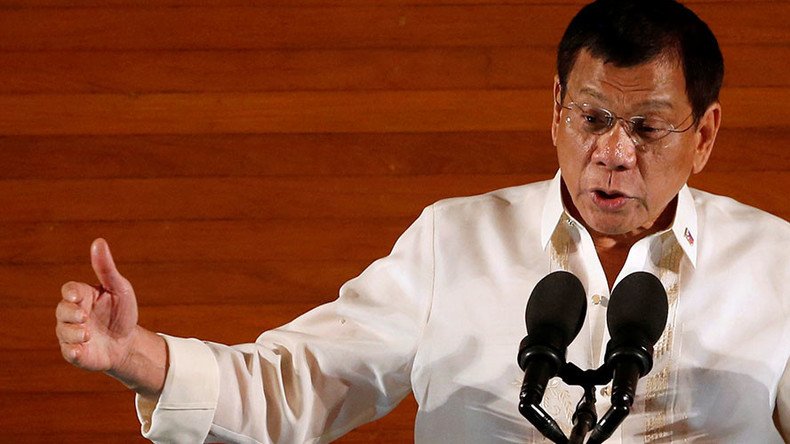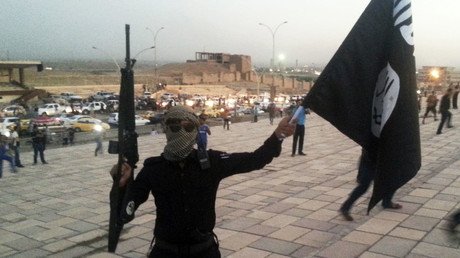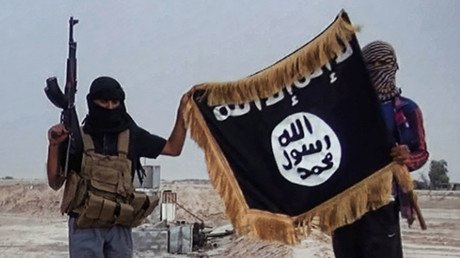Philippines leader calls US ambassador S.O.B. & gay, Washington demands clarification

The US summoned the Philippines’ envoy after its president, Rodrigo Roa Duterte, who is known for his loose-lip manner, attacked America’s ambassador with expletives in the latest spat of a feud that began between the two before Duterte was even elected.
Giving a speech in front of servicemen in Camp Lapu-Lapu in Cebu City on Friday, Duterte described his attitude towards US officials.
The Philippine president conceded “I am okay with him” when referring to US Secretary of State John Kerry, who had visited the country in late July, according to the PhilStar news platform.
US imported terrorism to Middle East, new Philippines president says https://t.co/Jh93Y8JH8C
— RT (@RT_com) July 10, 2016
However, he then lashed out at the US ambassador to the Philippines, Philip Goldberg, saying “I had an argument with their ambassador, that ‘bakla’ [gay]. Son of bitch, he really annoys me,” according to the Philippines’s Rappler media outlet, which noted that Duterte must have meant to use the word “gay” purely derisively, since Goldberg has never publicly identified himself as gay.
Duterte also accused Goldberg of “interfering in elections, giving statements here and there… He was not supposed to do that.”
Answering journalists’ questions at a daily press briefing on Monday, US Press Office director Elizabeth Trudeau said that the remarks made by the Philippines’ president concerning Goldberg were “inappropriate,” while refusing to quote them.
Bloody war on drugs: 465 dealers, pushers & addicts killed by vigilantes in Philippines in July alone https://t.co/zlfuHUqfps
— RT (@RT_com) August 2, 2016
“We have asked the Philippines charge [d’affaires] to come into the State Department to clarify those remarks,” she said.
The feud between the two goes back to before the country’s June 2016 election, when Goldberg commented on a gross joke made by Duterte regarding the 1989 murder of Australian missionary Jacqueline Hamill, who was gang raped and killed during a jail riot in the city of Davao, where Duterte was mayor at the time.
Back in April, then-presidential candidate Duterte effectively said that he had been mad about the Australian being raped at the time because “she was so beautiful. The mayor should have been first.”
The remark prompted outrage in Australia; Amanda Gorely, the country’s ambassador to the Philippines, said that violence against women must not be “trivialized.”
Goldberg also commented on the issue.
“I can only agree with the colleague from the Australian Embassy,” the US ambassador said in an interview aired by CNN Philippines in April. “Any statements by anyone, anywhere that either degrade women or trivialize issues so serious as rape or murder, are not ones that we condone.”
Philippines president urges to 'go ahead & kill' drug addicts https://t.co/BFoArD60Tl
— RT (@RT_com) July 1, 2016
Presidential hopeful Duterte slammed Goldberg over what he called interfering in the Philippine’s national elections, while threatening to sever all diplomatic ties with Washington if Goldberg did not “shut [his] mouth.”
Despite the controversies, which made international news headlines at that time, Rodrigo Duterte won the Philippine presidency in May, securing 38.9 percent of the vote.
READ MORE: 465 slain in July: Drug pushers purged in Philippines after presidential plea
He has never hesitated to use obscenities when responding to those doubting his ability to fulfill his promises. While campaigning for president in 2016, Duterte used another term, “bayot,” also meaning gay in the Bisaya language, to describe critics who were questioning his ability to suppress crime and drug abuse in a matter of 6 months.
Immediately after taking office in late June, Duterte announced a war on drug traffickers. A month later it was reported that the president’s appeal to wipe out all drug-related suspects had reaped a bloody harvest of hundreds of victims.














